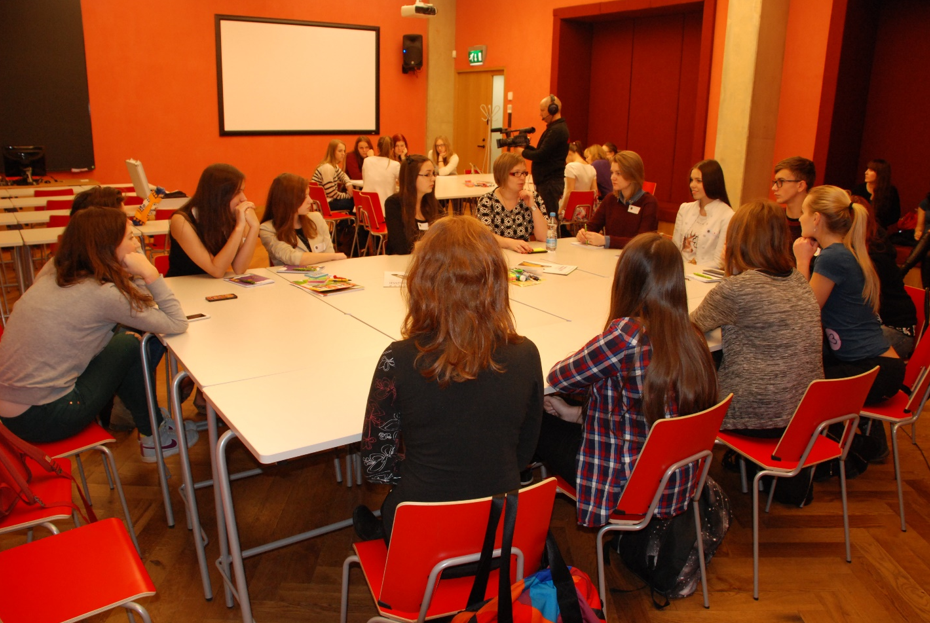By Sylvie Laffarge, Director of Citizenship Europe, Microsoft
As I mentioned in my previous blog post, last week was fully dedicated to coding and computer science education through a series of activities organized globally around the Hour of Code 2014. Run in partnership with Code.org, the Hour of Code involved events designed to motivate kids to take up coding. Microsoft was proud to be a platinum supporter of the global initiative and has been busy bringing this movement to life, having organised initiatives across 21 countries in Central and Eastern Europe and 12 countries in Western Europe. Here’s a bit of a taste of what happened last week…
In Central and Eastern Europe, events were organized, in partnership with local NGOs, governments, schools and even local celebrities in Romania, Lithuania, Latvia, Estonia, Serbia, Hungary, Malta, Poland, the Czech Republic, Slovakia, Slovenia, Bosnia and Herzegovina, Ukraine, Cyprus, Russia, Greece, Bulgaria, Albania, Macedonia and Kosovo.
One of the highlights was in Estonia where on December 8, two parallel events were held gathering 500 young people – the Minecraft Competition at the Garage48 hub, a community co-working space in Tallinn, and the DigiGirlz Narva event, together with TechSisters, at the Tartu University Narva College. Classrooms across the country were connected via Skype, allowing school kids to participate in a coding master class with their peers from across the country!
In Russia, the Ministry of Education recommended that all schools hold Hour of Code trainings, especially for students in 5th-11th grades. Local IT heroes and celebrities joined efforts and created a video aimed at inspiring young people to take up coding.
In Ukraine over 600 schools and more than 12 000 students joined numerous online and offline coding activities across the country under support of Ministry of Education.
![Hour-of-code-in-Ukraine[1]](https://news.microsoft.com/wp-content/uploads//2015/03/Hour-of-code-in-Ukraine1.png)
In Lithuania, the Microsoft teams organized a Coding Master Class at Vilniaus Jono Basanavičiaus gymnasium which was also live streamed on Delfi TV. Seventy five schools and around 2000 young people followed the live stream and learnt how to create mobile apps with Windows App Studio, a free tool from Microsoft, and games with the development ecosystem, Unity.
Our colleagues in Slovakia, in cooperation with two local nonprofits, DigiPoint and Aptech Europe organized a two day event where they provided computer science and coding trainings to high school girls.
Macedonia hosted the Code Camp 2014, organized in partnership with a .NET User Group. There were 4 tracks of trainings on technologies like: HTML5, JavaScript, .NET 4.5.x, ASP.NET vNext, Visual Studio 2013, SPA Technologies, SharePoint (2013), Office 365, and many more!
On December 12, the Microsoft Development Center Serbia hosted the closing event for the region, featuring inspiring speeches, coding master classes for high schools and career development sessions.
In Western Europe we also hosted a number of fantastic events! In the Nordics, our colleagues in Sweden and Denmark connected schoolchildren over Skype for a Nordic Kodu Battle, while Microsoft Finland hosted a whole week of trainings for children, teachers, developers and government elites, launched with a special #DevLife hackathon event. Coding training were also delivered by Microsoft Norway to 5,000-10,000 students in 80-100 schools across the country, in partnership with the non-profit organisation, Lær Kidsa Koding (Teach the Kids Coding).
Microsoft Spain launched the #AdoptaUnaPupilo (Adopt a Pupil) scheme. Microsoft Student Partner volunteers (made up of students with an interest in technology) have been matched up to younger mentees and will continue providing personal mentoring through April of next year. The scheme will end in May with an #AdoptaUnaPupilo contest, recognizing the best mentor-mentee pair.
In Portugal, Microsoft teams have supported Hour of Code trainings in 11 schools in 5 cities, reaching around 460 students.
In the United Kingdom, the team organized an employee “Hour of Codathon”, encouraging employees to run Hour of Code workshops on campus or via Lync with family, friends and schools.
In Ireland, we working with Digital Schools, Junior Achievement, the Arts Council and CoderDojo, we ran a range of events targeting both students and other life-long learners who’ve already completed their education but still want to code!
Microsoft Italy helped bring coding to Italian schools as a partner of the ministerial program, “Programma il futuro”. The program has been promoted by MIUR (Minister of Education, University and Research) and CINI (Inter-University Consortium for Information Technology), and supported by Confindustria Digitale, the industrialists’ federation to promote development of the digital economy. By the end of this week, their initiatives will have reached approximately 155,000 students in 8,000 classrooms. Furthermore, in partnership with Code.org, the “Restart Italy” event that took place in Bari on December 15 and 16 provided coding training to an additional 100 students.
Microsoft Germany launched the “Code your life” project in cooperation with several German schools, encouraging 10-14 year olds to learn how to code. The kids were given several hours to write their first algorithms, while gaining insights into AntMel and working with TouchDevelop.
Microsoft France, along with NGO Zup and K12 schools, invited kids to Paris for Hour of Code sessions and talks with professionals about jobs that are connected to coding.
We’d like to thank all our European partners who have helped up bring these many events to life across the region. It’s been great fun! And in closing, I’d like to invite you to take advantage of the remaining hours of the “Hour of Code” week by joining this initiative in your country and supporting the young generation to learn the new universal language of code. Because with coding, Everyone Starts Somewhere!




